Though Operation Mockingbird is often associated with the Cold War era, its implications and influence continue to resonate in the media today. The legacy of Operation Mockingbird has cast a long shadow on modern media, raising concerns about propaganda, gaslighting, disinformation, and the erosion of journalistic integrity.
The Origins of Operation Mockingbird
Operation Mockingbird is believed to have started in the early 1950s, a time when the United States was engaged in a tense ideological battle against the Soviet Union. The primary aim was to counter communist influence and shape public opinion, both domestically and internationally. By infiltrating the media, the CIA sought to promote its own narratives and propaganda, shaping public perceptions in line with its agenda.
Influence and Manipulations
The tactics employed by Operation Mockingbird are multifaceted and are still in effect today. The CIA provides journalists with sensitive information, often presenting it as leaks or exclusives. In return, journalists follow the agency’s guidance on what to cover or how to spin certain stories. Covert funding is also used to support media organizations sympathetic to the CIA’s objectives, ensuring their compliance with the agency’s narrative.
Operation Mockingbird compromised the integrity of journalism and eroded the public’s trust in the media. It created an environment where journalists became unwitting or willing conduits for government propaganda, blurring the line between information and disinformation.
Government-Sponsored Propaganda
One of the key aspects of Operation Mockingbird was the dissemination of government propaganda through media channels. While the explicit control over news organizations may have diminished, government-sponsored messaging remains prevalent today. Governments around the world employ public relations campaigns, strategic leaks, and media manipulation to shape public opinion and advance their agendas. This contemporary manifestation shares similarities with the objectives of Operation Mockingbird.
Embedded Journalism
Embedded journalism, where journalists are granted access to military operations and governmental activities, has become a common practice. While it can provide valuable insights, embedded journalism raises concerns about impartial reporting and the potential for journalists to become unwitting conduits for government narratives. This echoes the manipulation of journalists during Operation Mockingbird, where access to classified information and exclusive interviews was used to influence media coverage.
Corporate Influence on Media
While Operation Mockingbird primarily focused on the alleged infiltration of the CIA, today’s media landscape is also influenced by powerful corporations. The concentration of media ownership in the hands of a few conglomerates raises questions about editorial independence and potential biases. Corporate interests can shape the news through editorial decisions, advertising pressures, and the promotion of specific narratives that align with their agendas. This influence bears resemblance to the concerns raised by Operation Mockingbird about government control over media content.
Disinformation and Psychological Operations
Operation Mockingbird operated in an era prior to the internet and social media. However, the principles of manipulating information and influencing public opinion are still applicable today. The rise of social media platforms has provided new avenues for disinformation campaigns, fake news, and psychological operations. These tactics, used by state actors, political groups, and even individuals, can distort public discourse, sow division, and erode trust in the media, mirroring some effects attributed to Operation Mockingbird.
Whistleblower Revelations
Over the years, whistleblowers and investigative journalists have shed light on government activities, revealing instances of covert influence on the media. These revelations, such as those brought forth by Edward Snowden and WikiLeaks, demonstrate that attempts to shape public perception through media manipulation persist, albeit in different forms. The existence of these whistleblowers shows that aspects of Operation Mockingbird may still be in effect today, even if under different names or through new channels.
While the direct continuation of Operation Mockingbird in its original form is difficult to prove, its legacy casts a long shadow over the modern media landscape. Concerns surrounding media consolidation, political influence, disinformation, and intelligence agency relations persist, reminding us of the importance of a vigilant and independent press. Understanding the historical context of Operation Mockingbird empowers us to scrutinize media narratives and advocate for transparency, journalistic integrity, and the free flow of information in today’s one sided media environment.

Sorry, the comment form is closed at this time.